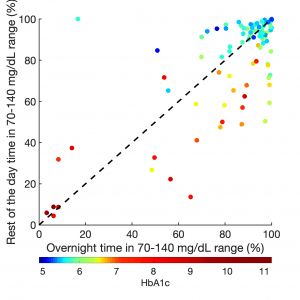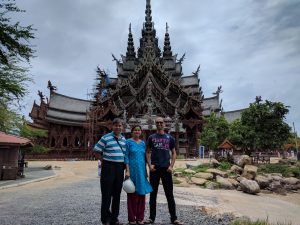Thrilled to announce I have been awarded the PATHS-UP Innovation seed award for 2021. Through this award, I will collaborate with Sansum Diabetes Research Institute in a new study to examine how individuals with or at-risk of diabetes learn from continuous glucose readings and then change their dietary, exercise, and other habits. I will use data science to derive novel bio-behavioral insights into diabetes management in underserved communities. I am grateful to PATHS-UP’s Industry Professional Advisory Board (IPAB) who make this award possible through their generous endowment.
Category Archives: Latest News
Manuscript on time of day-based signatures of diabetes progression in Lancet EClinicalMedicine
Excited to share that our latest manuscript showcasing new time-based glucose signatures from continuous glucose monitoring (CGM) that are potential predictors of diabetes onset and progression has been published in Lancet EClinicalMedicine. Crucially, this research was performed an underserved Hispanic/Latino cohort of participants which bears a disproportionate burden of Type 2 diabetes (T2D) but is also underrepresented in the research literature. We observed a pattern of increasing glucose abnormality from participants who are at risk of T2D, to those with pre-diabetes, to those with T2D, and interestingly these patterns differed during daytime and overnight. Our results suggest that the proposed time of day based glucose signatures can potentially portend the direction in which the disease is progressing.
Read the full paper here. Coverage of our work by News Medical can be found here. The paper has also been chosen as the cover of the next journal issue. Stay tuned for that!

Spatial co-localization work in Merkel Cell Carcinoma accepted to USCAP 2018
Our work with Dr. Phyu Aung, Dr. Michael Tetzlaff (Dept. of Pathology, M.D Anderson Cancer Center) and Dr. Ignacio Wistuba’s lab (Dept. of Translational Molecular Pathology) on studying the co-localization of B7-H3 expression in endothelial cells of Merkel Cell Carcinoma (MCC) patients, has been accepted as an abstract to the prestigious United States and Canadian Academy of Pathology (USCAP) Annual Meeting in March 2018. MCC is a very aggressive form of skin cancer, and patient response is closely linked to immune system integrity. The B7-H3 biomarker has been shown to be a potent inhibitor of the human body’s immune response. We used our novel spatial infiltration metric on multiplexed Immunofluorescence images of resected MCC tumors, to compute the extent of B7-H3 expression in endothelial cells. This quantification enables us to now directly study the impact of B7-H3 colocalization on patient outcome, potentially allowing us to design optimal immunotherapy regimens for individual patients with MCC!!
Radiomics based ORN prediction work accepted in ASTRO-HNC 2018
Our work with Dr. Hesham Elhalawani (Dept. of Radiation Oncology, M.D Anderson Cancer Center) on early prediction of Osteo-radio-necrosis (ORN) using radiomics has been accepted to the American Society for Radiation Oncology’s Head and Neck cancer (ASTRO-HNC) symposium in 2018. We show that a functional principal component analysis (FPCA) of radiomic features extracted at multiple time points before and after radiotherapy, can predict for ORN development in patients. We significantly outperform prediction models based on pre-radiotherapy images and delta radiomics (current practice). We envisage our FPCA screening tool can be used by radiologists to optimize radiation plan for patients undergoing radiotherapy!
Back to Houston!
New book chapter: Radiogenomics and Histomics in Glioblastoma
Our invited book chapter on the advances made in radiology and histopathology analysis in glioblastoma using image processing and machine learning. Great job Michael Lehrer in integrating all our contributions to this chapter! Check it out here.
PDAC Nature Communications manuscript is out
Our work on showing the spatial distribution of intratumoral T cells in the tumor has a significant effect on survival is now published in Nature Communications! Find the paper here. It was a great experience to combine our ideas on spatial statistics with the cancer biology expertise of Julienne Carstens and Pedro Correa at MD Anderson.



